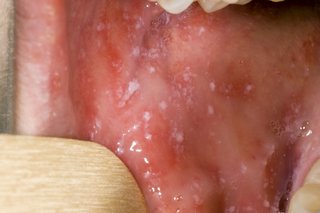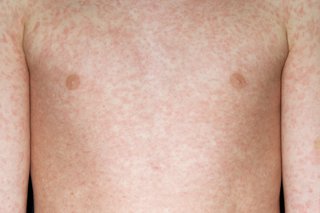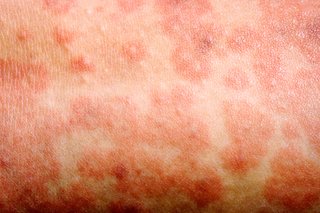Measles is a highly infectious viral illness that can be very unpleasant and sometimes lead to serious complications. It's now uncommon in the UK because of the effectiveness of vaccination.
Anyone can get measles if they have not been vaccinated or have not had it before, although it's most common in young children.
The infection usually clears in around 7 to 10 days.
Symptoms of measles
The initial symptoms of measles develop around 10 days after you're infected.
These can include:
- cold-like symptoms, such as a runny nose, sneezing and a cough
- sore, red eyes that may be sensitive to light
- a high temperature (fever), which may reach around 40C (104F)
- small greyish-white spots on the inside of the cheeks
A few days later, a red-brown blotchy rash will appear. This usually starts on the head or upper neck before spreading outwards to the rest of the body.
When to see a GP
You should contact a GP as soon as possible if you suspect that you or your child may have measles.
It's best to phone before your visit as your GP surgery may need to make arrangements to reduce the risk of spreading the infection to others.
You should also see a GP if you have been in close contact with someone who has measles and have not:
- been fully vaccinated with 2 doses of the MMR vaccine
- had the infection before
You should do this even if you do not have any symptoms.
Is measles serious?
Measles can be unpleasant, but will usually pass in about 7 to 10 days without causing any further problems.
Once you have had measles, your body builds up resistance (immunity) to the virus and it's highly unlikely you'll get it again.
But it can lead to serious and potentially life-threatening complications in some people.
These include infections of the lungs (pneumonia) and brain (encephalitis).
How measles is spread
The measles virus is contained in the millions of tiny droplets that come out of the nose and mouth when an infected person coughs or sneezes.
You can easily catch measles by:
- breathing in these droplets
- touching a surface the droplets have settled on and then placing your hands near your nose or mouth (the virus can survive on surfaces for a few hours)
People with measles are infectious from when the symptoms develop until about 4 days after the rash first appears.
How measles can be prevented
Measles can be prevented by having the measles, mumps and rubella (MMR) vaccine.
This is given in 2 doses as part of the NHS childhood vaccination programme.
The first dose is given when your child is around 13 months old, and a second dose is given at 3 years and 4 months.
Adults and older children can be vaccinated at any age if they have not been fully vaccinated before. Ask a GP about having the vaccination.
If the MMR vaccine is not suitable for you, a treatment called human normal immunoglobulin (HNIG) can be used if you're at immediate risk of catching measles.
How you can ease the symptoms of measles
There are several things you can do to help relieve your symptoms and reduce the risk of spreading the infection.
These include:
- taking paracetamol or ibuprofen to relieve fever, aches and pains (aspirin should not be given to children under 16 years old)
- drinking plenty of water to avoid dehydration
- closing the curtains to help reduce light sensitivity
- using damp cotton wool to clean the eyes
- staying off school or work for at least 4 days from when the rash first appears
In severe cases, especially if there are complications, you or your child may need to be admitted to hospital for treatment.
How common is measles?
Since 2016, there has been a rise in cases of measles in the UK.
There were 284 confirmed cases in England and Wales in 2017, which then rose sharply to 991 cases in 2018.
This rise is because take-up of the MMR vaccine has fallen since 2016.
It means the UK has now lost its "measles-free" status.
Make sure your children get both doses of the MMR vaccine.
This should help the UK regain its measles-free status.
Page last reviewed: 14 August 2018
Next review due: 14 August 2021



